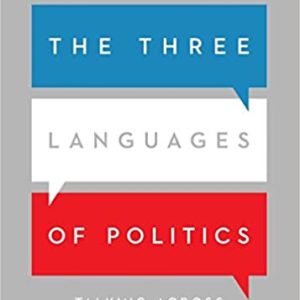Tribal Talk: The Three Languages of Politics
Why do people, today, seem so often to be talking past one another? How can folks interpret the facts in such radically different ways? And why does it seem that there is less interest in the art and rhetoric or persuasion, while the rhetoric of demonization has become our go-to?
 The third edition of Arnold Kling’s book-length essay, The Three Languages of Politics: Talking Across the Political Divides, came out last year. I’ve found the framework Kling develops helpful in coming to grips with the questions with which I opened.
The third edition of Arnold Kling’s book-length essay, The Three Languages of Politics: Talking Across the Political Divides, came out last year. I’ve found the framework Kling develops helpful in coming to grips with the questions with which I opened.
Kling says that three political languages dominate our discourse: progressive, conservative and libertarian.
Each language/ political perspective has its own understanding of what is the “big bad,” the real problem, of the great Satan, so to speak. And each has an axis through which the world is construed and interpreted.
For progressives the big bad is oppression. The moral — political interpretative axis of progressives is the oppressors versus the oppressed. Everything is filtered through this lens of the oppressor and the oppressed. Everything can be explained in these terms.
Conservatives have a different big bad: barbarism, threats to civilization. The barbarians are at the gates! For conservatives the axis is barbarians versus civilization. This or that problem is framed as a “threat to civilization,” or to “our way of life.”
For libertarians the big evil is coercion. Their moral — political axis pits freedom against coercion. And because the state or government is the largest form of legally sanctioned coercion, libertarians tend to be most concerned about state sponsored or enacted coercion.
You can see these three languages at work everywhere and on almost every issue. Take COVID. Progressives are all over dis-proportionality of impact and matters of equity in effects and treatment.
Libertarians don’t like government restrictions and shut-downs. They distrust the information being put out by various arms of the government and detect a slippery slope from pandemic restrictions to government running all aspects of American life.
On this one, COVID, the conservative position is perhaps the least clear. It has elements of the libertarian suspicion of government, seeing closures as a threat to the economic system that is basic to our way of life and civilization. And there’s the xenophobic strand, as in “China-flu.” Still, there are probably some conservatives who see those who flaunt COVID precautions as the real barbarians.
Kling argues that whichever tribe you belong to or tend toward, you have an emotional attachment to what your tribe considers the big evil: oppression, barbarism or coercion. One of those really gets you hooked, gets you going and makes you angry.
He also says that the point of these three differing political languages is not to talk with people of a different point of view. No, it is to talk to people in one’s own tribe, and to demonize the people with whom you disagree. And those with whom one disagrees are not simply that, i.e. people with whom you disagree. They are the enemy, they are people who are out to cause harm.
So progressives wishing to demonize an opponent will tag him or her as “one of the oppressors,” while conservatives dub their adversaries as “civilization destroying barbarians,” and so on.
These languages are emotional appeals that rally and galvanize a tribe’s base and says what — and who — we are against. That is called “negative polarization.” Instead of appealing to people on the basis of a particular program or set of policies that you are for and wish to see enacted, you appeal to people on the basis of a common enemy, of who you are against.
Now, none of this is very uplifting. But it does seem to me a useful framework for getting at a question like, “Why are people so often, today, talking past one another?”
Besides understanding what’s going on, I can think of a couple other uses for Kling’s three languages framework. First, it would suggest — at least to me — that whatever tribe we are in or tend toward, we would do well to exercise some skepticism about our own tribe’s explanatory framework and emotional appeals.
Progressives might try to pull back a bit from appeals to take to the figurative barricades and ask, “Is oppression really what’s going on here?” While conservatives might also step back a pace or two before seeing this issue or person as the threat to human civilization. Likewise, the libertarian could ask, “Is this really Big Brother, or maybe not? Maybe even an idea worth considering?”
Second, being aware of the interpretative lens of the other tribes could lead us to grant a bit more consideration, understanding and even legitimacy to that point of view.
My own view, as I’ve noted here in the past, is that some where along the way we Americans have vested politics with an aura and ultimacy that used to belong to religion. These days, one-time sectarian enemies like Protestants and Catholics, seem by and large to be getting along pretty well. But it’s people of the other party or political ideology that we are more likely to see as a mortal threat. We are, in a word, way too “politicized.”
Let’s hope the religious wars of the 17th century, conflicts that led to the legal separation of church and state in America, don’t become the political wars of the 21st.
![Anthony B. Robinson [logo]](https://www.anthonybrobinson.com/wp-content/themes/anthonybrobinson/images/logo.png)
![Anthony B. Robinson [logo]](https://www.anthonybrobinson.com/wp-content/themes/anthonybrobinson/images/logo-print.png)
